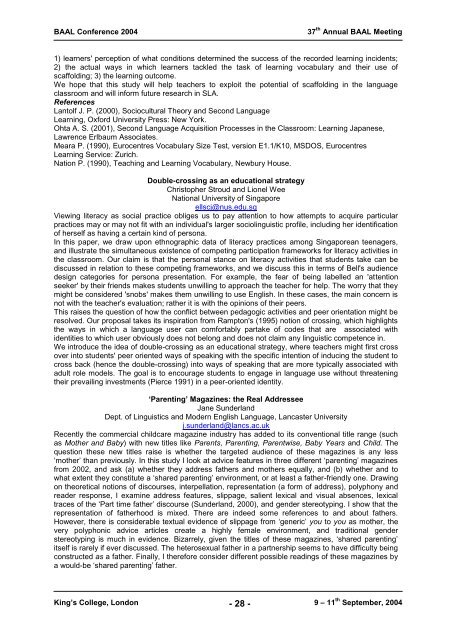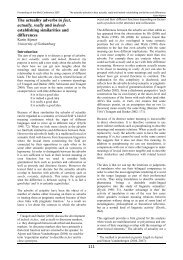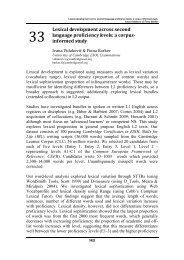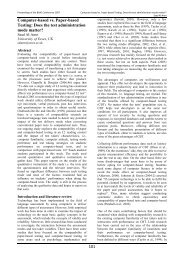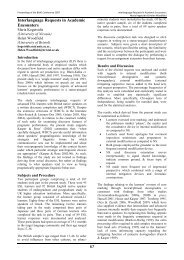Colloquia - British Association for Applied Linguistics
Colloquia - British Association for Applied Linguistics
Colloquia - British Association for Applied Linguistics
Create successful ePaper yourself
Turn your PDF publications into a flip-book with our unique Google optimized e-Paper software.
BAAL Conference 2004 37 th Annual BAAL Meeting<br />
1) learners' perception of what conditions determined the success of the recorded learning incidents;<br />
2) the actual ways in which learners tackled the task of learning vocabulary and their use of<br />
scaffolding; 3) the learning outcome.<br />
We hope that this study will help teachers to exploit the potential of scaffolding in the language<br />
classroom and will in<strong>for</strong>m future research in SLA.<br />
References<br />
Lantolf J. P. (2000), Sociocultural Theory and Second Language<br />
Learning, Ox<strong>for</strong>d University Press: New York.<br />
Ohta A. S. (2001), Second Language Acquisition Processes in the Classroom: Learning Japanese,<br />
Lawrence Erlbaum Associates.<br />
Meara P. (1990), Eurocentres Vocabulary Size Test, version E1.1/K10, MSDOS, Eurocentres<br />
Learning Service: Zurich.<br />
Nation P. (1990), Teaching and Learning Vocabulary, Newbury House.<br />
Double-crossing as an educational strategy<br />
Christopher Stroud and Lionel Wee<br />
National University of Singapore<br />
ellscj@nus.edu.sg<br />
Viewing literacy as social practice obliges us to pay attention to how attempts to acquire particular<br />
practices may or may not fit with an individual's larger sociolinguistic profile, including her identification<br />
of herself as having a certain kind of persona.<br />
In this paper, we draw upon ethnographic data of literacy practices among Singaporean teenagers,<br />
and illustrate the simultaneous existence of competing participation frameworks <strong>for</strong> literacy activities in<br />
the classroom. Our claim is that the personal stance on literacy activities that students take can be<br />
discussed in relation to these competing frameworks, and we discuss this in terms of Bell's audience<br />
design categories <strong>for</strong> persona presentation. For example, the fear of being labelled an 'attention<br />
seeker' by their friends makes students unwilling to approach the teacher <strong>for</strong> help. The worry that they<br />
might be considered 'snobs' makes them unwilling to use English. In these cases, the main concern is<br />
not with the teacher's evaluation; rather it is with the opinions of their peers.<br />
This raises the question of how the conflict between pedagogic activities and peer orientation might be<br />
resolved. Our proposal takes its inspiration from Rampton's (1995) notion of crossing, which highlights<br />
the ways in which a language user can com<strong>for</strong>tably partake of codes that are associated with<br />
identities to which user obviously does not belong and does not claim any linguistic competence in.<br />
We introduce the idea of double-crossing as an educational strategy, where teachers might first cross<br />
over into students' peer oriented ways of speaking with the specific intention of inducing the student to<br />
cross back (hence the double-crossing) into ways of speaking that are more typically associated with<br />
adult role models. The goal is to encourage students to engage in language use without threatening<br />
their prevailing investments (Pierce 1991) in a peer-oriented identity.<br />
„Parenting‟ Magazines: the Real Addressee<br />
Jane Sunderland<br />
Dept. of <strong>Linguistics</strong> and Modern English Language, Lancaster University<br />
j.sunderland@lancs.ac.uk<br />
Recently the commercial childcare magazine industry has added to its conventional title range (such<br />
as Mother and Baby) with new titles like Parents, Parenting, Parentwise, Baby Years and Child. The<br />
question these new titles raise is whether the targeted audience of these magazines is any less<br />
„mother‟ than previously. In this study I look at advice features in three different „parenting‟ magazines<br />
from 2002, and ask (a) whether they address fathers and mothers equally, and (b) whether and to<br />
what extent they constitute a „shared parenting‟ environment, or at least a father-friendly one. Drawing<br />
on theoretical notions of discourses, interpellation, representation (a <strong>for</strong>m of address), polyphony and<br />
reader response, I examine address features, slippage, salient lexical and visual absences, lexical<br />
traces of the „Part time father‟ discourse (Sunderland, 2000), and gender stereotyping. I show that the<br />
representation of fatherhood is mixed. There are indeed some references to and about fathers.<br />
However, there is considerable textual evidence of slippage from „generic‟ you to you as mother, the<br />
very polyphonic advice articles create a highly female environment, and traditional gender<br />
stereotyping is much in evidence. Bizarrely, given the titles of these magazines, „shared parenting‟<br />
itself is rarely if ever discussed. The heterosexual father in a partnership seems to have difficulty being<br />
constructed as a father. Finally, I there<strong>for</strong>e consider different possible readings of these magazines by<br />
a would-be „shared parenting‟ father.<br />
King‟s College, London 9 – 11 th - 28 -<br />
September, 2004


